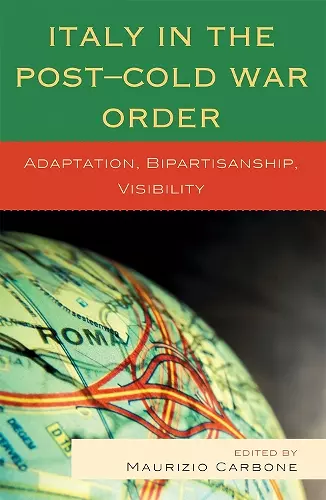Italy in the Post-Cold War Order
Adaptation, Bipartisanship, Visibility
Format:Hardback
Publisher:Lexington Books
Published:24th Feb '11
Currently unavailable, and unfortunately no date known when it will be back

There are little doubts that Italy has attempted to play a more assertive role in the international arena since the end of the Cold War. During the first forty years of its Republican history, conditioned by both the polarized international context and an antagonistic domestic political system, Italy delegated its main choices in international affairs to external actors, most notably NATO and the European Union. The transition from a bipolar to a unipolar/multipolar world order provided Italy with new opportunities to pursue its political and commercial interests more autonomously, as well as new responsibilities, to actively contribute to solving conflicts and addressing new global threats. At the same time, the collapse of the traditional parties (linked to the fall of the Berlin wall and the Clean Hands enquiries) and the changes of the electoral law (from a proportional representation into a quasi-majoritarian system) generated two heterogeneous coalitions which have regularly alternated in power, but do not always share the same views and approaches-with differences at times of form, and more often of substance. Against this background, Italy in the Post-Cold War Order: Adaptation, Bipartisanship, Visibility, edited by Maurizio Carbone, seeks to explain the evolution of Italy's international action over a twenty-year span (1989–2009). Three central questions are addressed. First, how does Italy adapt to transformations of the international system? Second, how does its ever-changing political system influence Italy's choices in foreign relations? Third, how do domestic structures constrain (or enable) Italy's place on the world stage? To answer these questions, this book consists of two broad parts. The first part sets the context and discusses issues 'horizontally,' focusing on foreign policy, security and defense policy, development cooperation, and multilateral action. The second part, which takes a 'vertical' approach, discusses Italy's relations with key countries and regions of the world
This book offers new perspectives in the analysis of the ways in which domestic politics and foreign policy are connected. Its implications therefore extend far beyond the single case—Italy—on which it is based, making it essential reading for comparativists and international relations scholars generally. -- Leonardo Morlino, Former President, International Political Science Association (IPSA)
This book provides a variety of insights into the new role acquired by Italy in the post-cold war world. Commendably, it examines the country not only with regard to the Atlanticism-Europeanism dichotomy but also in terms of its action in various areas of the world. -- Alberta M. Sbragia, University of Pittsburgh
In tackling its problems, in the now overlapping spheres of domestic and foreign policy, Italy needs an ever more developed and sophisticated public debate. Academic work is not the only source of ideas and information, but its long-term contribution to the knowledge community is indispensable. The essays in this book are a most welcome sign of the interest in Italian foreign policy to be found among the younger generation of International Relations scholars and of the expertise they can bring to bear. -- Christopher Hill, University of Cambridge
ISBN: 9780739137116
Dimensions: 241mm x 163mm x 25mm
Weight: 615g
294 pages